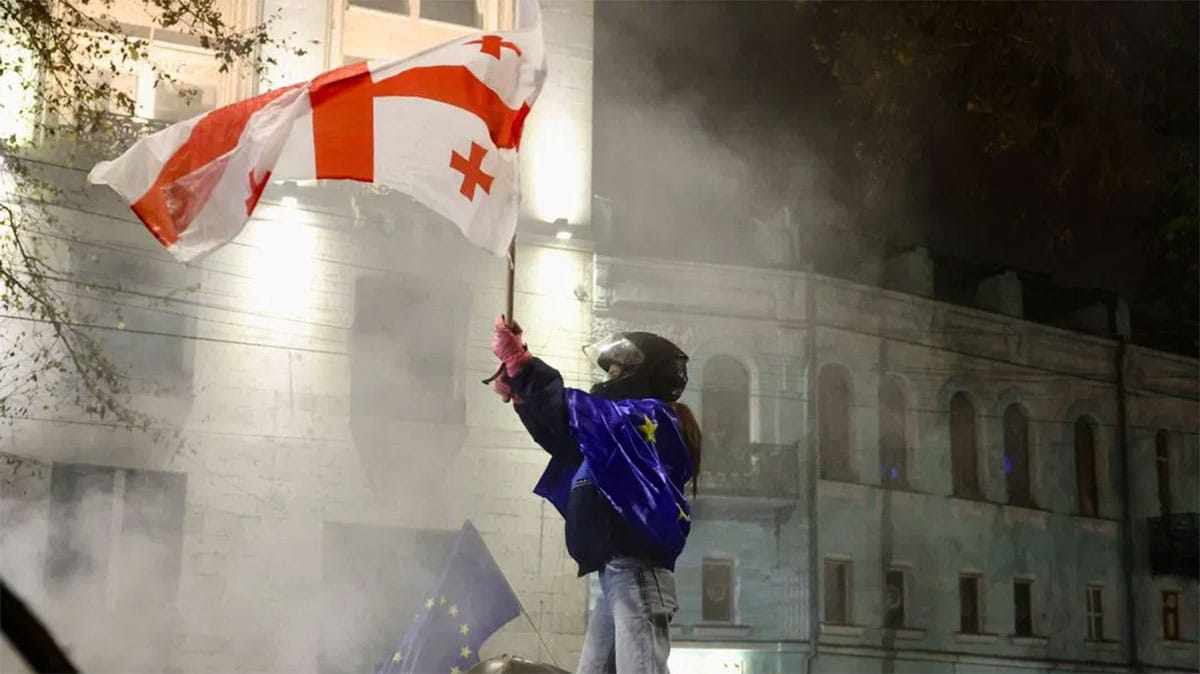December 29 marked a day of escalating tensions in Georgia as political divisions, protests, and questions of legitimacy engulfed the country. At the heart of the unrest was the inauguration of Mikheil Kavelashvili, the Georgian Dream party’s chosen candidate, as the new president, sparking widespread protests and a defiant address from outgoing President Salome Zurabishvili.
The day began with crowds assembling outside the Orbeliani Presidential Palace, where Zurabishvili addressed the nation for the final time as president. In her speech, she emphasized her belief in the legitimacy bestowed upon her by the people, declaring that she would continue her work as the “only legitimate institution in the country.” Her poignant statement underscored the deep divisions between the ruling Georgian Dream party and the opposition, as well as the broader public discontent over the political direction of the nation. Despite her official term ending, Zurabishvili’s words hinted at her intention to remain an active figure in the ongoing struggle for what she described as the preservation of Georgia’s sovereignty and democracy.
Simultaneously, the Georgian Dream party conducted Kavelashvili’s inauguration in the parliament building. The ceremony was notable for its lack of international and military representation. No foreign ambassadors were present, a break from tradition that the ruling party attributed to space constraints. Moreover, the conspicuous absence of EU flags in the plenary hall reflected a symbolic departure from Georgia’s previous pro-European stance. The hall, adorned only with Georgian flags and traditional motifs, signified a shift that many critics viewed as aligning the country closer to Russian and Iranian influences. The presence of Georgian Dream patron Bidzina Ivanishvili added to the perception of growing oligarchic control over the country’s political framework.
As the inauguration unfolded, tensions spilled onto Rustaveli Avenue, where protesters gathered to voice their opposition to Kavelashvili’s presidency. Eyewitnesses reported arbitrary detentions by the police, who claimed the demonstrators were blocking traffic. However, human rights activists and onlookers challenged this narrative, accusing law enforcement of excessive force and unjustified arrests. Later in the day, six of the detained individuals were released on parole, but the damage to public trust in the government’s handling of dissent had already been done.
The political discord drew international attention, with U.S. Representative Joe Wilson issuing a strong statement of support for Zurabishvili. Calling her the “only legitimate Georgian leader,” Wilson condemned Kavelashvili’s inauguration as a sham orchestrated by external influences, including China and Iran. He reaffirmed America’s commitment to supporting Georgia’s sovereignty and the will of its people, emphasizing the importance of free and fair elections as a cornerstone of democracy.
Zurabishvili’s address, combined with the protests and Wilson’s endorsement, reflected the growing polarization within Georgia. The lack of international recognition for Kavelashvili’s presidency highlighted broader concerns over the country’s political trajectory. Critics argue that the Georgian Dream party’s actions are steering the nation away from its European aspirations, a claim bolstered by recent decisions such as excluding EU flags from official ceremonies.
As the day ended, Georgia stood at a crossroads. The events of December 29 underscored the fragility of its democratic institutions and the challenges of navigating a path toward stability and unity. The coming weeks are expected to see continued unrest as both sides grapple with questions of legitimacy, governance, and Georgia’s place on the international stage. For many Georgians, the struggle is not just about leadership but about the future direction of their country in a rapidly shifting geopolitical landscape.









































